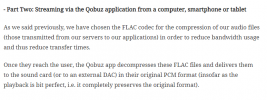GoldenSound Responce is more interesting..
I'd like to respond to a few things said in this video:
2:30 - Only one of the files was 24 bit. And as discussed in the video, MQA said that issues occurred because I applied no dithering, the mistake they made being that they seemingly didn't bother to check all the files I had published else they'd have seen I DID have dithered versions. Some were dithered, some were not, to see if this did indeed have an impact. The "properly dithered" file actually had worse results.....
2:40 - MQA's encoder is not something that artists have access to. It is private, and artists cannot access it. Artists prepare the track, and then submit it to the publisher and request MQA encoding. It is not done by the artist or production engineers at least in the vast majority of cases. MQA files are encoded/altered after the mastering process is already done. Warner actually batch converted millions of songs in their catalog to MQA all at once, including tracks that were made and released years ago and obviously wouldn't have had MQA involvement at any point.
https://www.forbes.com/sites/marksparrow/2020/11/12/millions-of-mqa-tracks-coming-to-tidal-masters-from-warner-music/?sh=63b7adb423c2 Additionally, to be very clear, I had my tracks published according to MQA's own instructions for artists. I didn't get them through some alternate back-door process. It was using their recommended partnered publishing firm. There was no shady stuff going on here and the way in which my tracks got onto tidal in MQA is the same way that the vast majority of MQA content does.
3:29 - I did do this. That is what I am comparing to throughout my video. The versions that went up on other services like Amazon HD and Deezer were identical to my master files. The MQA encoded ones were altered by the MQA encoding process and were no longer the same as my masters.
3:58 - For any track that isn't marked as "Master" on tidal, it is 100% bitperfect to the version on Deezer or Amazon HD. For anything marked "Master", it is not. It is not Tidal that altered the file, it is the MQA process specifically.
4:17 - I did do a check of Tidal vs Roon output. They were bitperfect and identical to eachother (as one would hope/expect), I also compared Qobuz and again it was bitperfect. All these services and players operate proper bitperfect output. It was only when the file itself differed that there was a difference.
4:43 - I would be happy to repeat the testing with a different MQA dac. But most of the testing in my video was done with the Tidal/Roon core MQA decoder which is what the vast majority of people will be using. There didn't seem to be a difference between using core decoder -> renderer, vs using full decode on the dac. So that was at least consistent on MQA's part.
5:30 - There is plenty of proof that MQA's filter is leaky. Other users have actually even managed to extract the filter coefficients from the firmware of MQA enabled products to replicate it on open-source resampling tools like SoX,
https://code.videolan.org/mansr/mqa . The whitenoise and impulse response tests on real world products confirm this previous evidence from other users as the filter design matches the predicted one.
6:00 - Again, I wasn't the one that encoded it. MQA does not allow artists access to the MQA encoder. It is all done after production by the publisher and at no point is the artist allowed to touch it. The "Studio Tools" allow for someone to preview an MQA encode. But that is it. It doesn't give you any deeper level access to the encoder.
6:10 - The noise was present in the raw file, before AND after unfolding. The DAC had nothing to do with it. Again much of the testing was done via bitperfect recording of the output of the MQA core decoder, not an analog recording from a DAC. The analog DAC recordings were only used to check that the digital recordings matched, and when testing the "full decode"
7:00 - There are plenty of tests they could provide which would not allow for any kind of reverse engineering, but still prove that MQA's claims are true. Additionally, MQA's rendering stage has already been reverse engineered, Archimago, MansR and various others have written about this. My testing simply confirms what they had already found but in a different manner.
7:30 - Absolutely nothing was doctored, this is completely untrue. And the raw files (both original masters and MQA versions) have been posted for others to verify and investigate for themselves if they doubted that. I've been 100% transparent and made the resources available for others to verify and build upon.
8:00 - It was not. I included as many of the standard tests used all throughout R&D of various audio products. The RMAA test isn't "biased" at all. If MQA cannot handle that, it is not my fault, and i'd suggest taking it up with AES who sets most of the testing standards in the audio industry (the -60dB dynamic range test as an example which I used in my video, this is AES standard testing for dynamic range. Not some 'biased' method I cooked up)
8:25 - I've posted the files, anyone is free to test them themselves and raise issues or flaws if they find them. So far no one has found anything other than what I'd already said in the video.
8:35 - I'd love to, and I offered MQA to work with them to create a test suite that would be agreeable to them, myself and the wider community. They didn't
9:20 - It does not show that the tests were flawed. It shows that MQA provided a defensive response. Most of the points were either demonstrably false and discussed either in the video or by others on the various threads created after the video on ASR/APS/SBAF etc.
9:30 - Being angry that a product that was SOLD to people as being 'lossless', turning out not to be lossless. Isn't toxic. If a car manufacturer sold you a car and told you it was turbocharged, but later you found out it just had a fan which made the same noise and didn't help performance at all, possibly even hurting it, you'd probably be annoyed, and rightly so. If MQA were to simply be transparent and provide a shred of evidence for their claims then we could all go home. So far, they've provided none. And so given as my evidence, archimago's evidence, Mansr's evidence, John Atkinson's evidence, Chris Connaker's evidence, and various others, all show flaws in MQA's processes, I don't really know how much more is needed before it'd be considered reasonable for MQA to provide some of their own if they want people to believe all of the evidence others have provided is false....
10:55 - This is the problem. You can't just "Not use it". If you have tidal, you have NO CHOICE but to use the MQA file if it is a track marked as "master". There is no lossless option. If you choose the "hifi" tier it still gives you the MQA file just without the MQA tagging so it doesn't get unfolded. It is not the lossless file. MQA is being added into more and more products, adding costly license fees even though manufacturers themselves dislike it. (I have had several major manufacturers contact me to express their frustration about working with and implementing MQA since the video went up, its not just bad for consumers, its bad for manufacturers too. More than one of whom also shared some worrying information about MQA's upsampling filter and restrictions they impose on manufacturers which I'll discuss soon) And consumers have no option to opt-out of the MQA version other than on a handful of products. MQA is currently losing £4m/year, they are not planning to continue operating as they are now. They are planning to grow until they are the de-facto standard and manufacturers have no choice but to implement it. And customers have no choice but to pay for it.
Secondly. I'm not calling for them to be "cancelled", i'm calling for Tidal to offer lossless again, the entire premise their business is built upon, and for MQA to be at least in the very slightest a little bit transparent. Also, MQA is a company, not a person. Always remember, a public company has the interests of it's shareholders at heart, not the community, not you, not me, not anyone else. If a company is acting in an irresponsible fashion, and what some might argue amounts to scamming people. They SHOULD be called out.
This isn't an issue of finding some tweet someone posted 8 years ago and trying to end their career because of it. This is an issue of a company lying and selling a product with provably false promises, taking money from the community you want to support.



 www.audiosciencereview.com
www.audiosciencereview.com

 audiophilestyle.com
audiophilestyle.com

audiophilestyle.com



